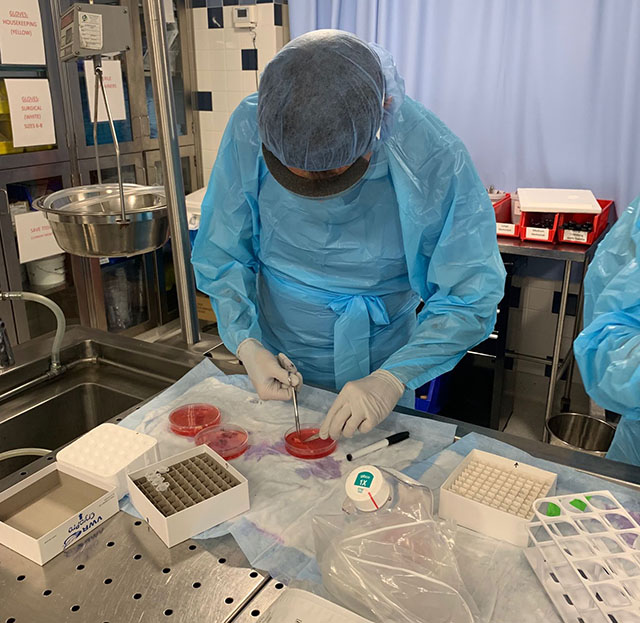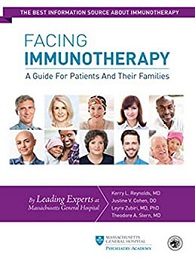Researching Immunotherapy Side Effects to Improve Treatment
Cancer research and innovative treatments, like immunotherapy, are helping cancer patients with advanced disease live longer.
Weather AlertWe are monitoring the weather's impact on our services. If you are experiencing a medical emergency, call 911 or go to the nearest emergency department. Mass General Brigham's emergency departments remain open. For real-time updates and service changes, please check our Alerts page.View Alerts page
Mass General Brigham Cancer Institute
Contact Information
If you have any questions about the SIC service, please contact Kerry Reynolds, MD at kreynolds7@partners.org or Courtney Jenkins at cjenkins2@mgh.harvard.edu.
Support Our Effort
Your gift to the Severe Immunotherapy Complications Service and Clinical-Translational Research Effort at Mass General will help our team address the urgent need to understand how and why immune-related adverse events occur. With your support, we will achieve our common goal of understanding and treating these side effects so patients can continue on their lifesaving immunotherapy treatments.
Receiving an online second opinion can offer reassurance about a challenging diagnosis or help plan the most appropriate course of treatment. The Severe Immunotherapy Complications (SIC) program has a world-class team of specialists, comprising oncologists focusing on immunotherapy complications, alongside experts in neurology, gastrointestinal health, cardiology, hematology, rheumatology, nephrology, dermatology, pulmonary, renal, and ophthalmology. These experts are available to offer remote second opinions to patients and health care providers, eliminating the necessity for travel to Boston.
Request an online second opinion from our specialists
We are in the midst of an exciting revolution in the treatment of cancer. By harnessing and enhancing the body’s immune system using novel therapies such as immune checkpoint inhibitors, we can reduce the amount of tumor burden in patients and, in a subset of patients and cancers, achieve long-lasting remission. However, these therapies are often limited by the unchecked activation of the immune system which can result in immune-related adverse events (irAEs). This toxicity can affect nearly every organ system, ranging from a minor rash to severe dermatological, gastrointestinal, pulmonary, or cardiac complications.
As more patients are treated with immunotherapy, there is a corresponding increase in the number of patients experiencing toxicity which highlights the urgent need to understand how and why immuno-toxicities occur and develop rigorous pathways for how to best manage them.
Researchers take aim at cancer drugs’ toxic side effects
Learn more about the Severe Immunotherapy Complications program in Science.
The Severe Immunotherapy Complications (SIC) Service and Clinical-Translational Research Effort, the first-of-its kind across the country, has been at the forefront of developing expertise in the recognition of complex irAE presentations and the management of toxicity. Since October 2017, this multidisciplinary group of clinicians and researchers have been involved in the care of every patient admitted with a suspected irAE after checkpoint blockade immunotherapy.
Each patient presenting to the Mass General Brigham Cancer Institute with clinical signs or symptoms consistent with an irAE is seen by one of the Cancer Center’s 12 SIC service oncologists, all of whom have expertise in managing severe irAEs. The SIC team can be paged to see admissions 7 days a week, 24 hours a day. The oncologists round daily, review all data related to irAEs, examine and evaluate all patients being treated for irAEs and discuss patient care with the relevant SIC service subspecialists. There are SIC subspecialists from the oncology, allergy/immunology, cardiology, dermatology, endocrinology, hematology, nephrology, neurology, ophthalmology, pulmonology, gastroenterology, infectious disease, and rheumatology divisions.

Led by Kerry Reynolds, MD and Chloe-Alexandra Villani, PhD, this multidisciplinary team now comprises more than 50 individuals across 19 areas of the hospital and includes 6 postdoctoral clinical fellows that bridge between clinical and translational efforts, working in both the clinic and the laboratory of Dr. Villani.
Members of the SIC team also advise and educate the larger network community via case discussions and literature review in an educational lecture series every other week. The experts serve as the central referral source for complex cases of irAEs in the city, the state, and beyond. The guiding principle of the clinical SIC service is to develop expertise in recognition and management of irAEs and to extend that expertise to the larger network community and subspecialty arenas.
Our work to date shows that a highly subspecialized care team focused on irAEs can improve clinical outcomes for patients while also creating infrastructure needed to drive future research on irAEs. Importantly, the process of developing expertise in clinical care interfaces directly with development of well-defined clinical phenotypes that can be used to understand the spectrum of these events.
What makes our approach so novel is that we have crossed traditional departmental boundaries at our institution and brought together expertise from each and every relevant clinical division, along with cutting edge scientists, to form a new hybrid community with a common goal. This was possible given that Massachusetts General Hospital is a “general” hospital with previous expertise in autoimmunity across disease states and, importantly, because there exists an undeterrable sense of community and dedication to our patients.
The SIC service has also joined together to set up an infrastructure for specimen collection, under the leadership of Dr. Alexandra-Chloe Villani, with the hope of understanding the mechanisms driving irAEs. One of our goals is to develop better therapies for treating autoimmune toxicities, while maintaining anti-tumor immunity.

This group of scientists and clinicians are working towards developing a better understanding of the biological players and underlying molecular and cellular mechanisms involved in driving irAEs by directly studying patient blood and matched affected tissue samples using a range of systems immunology, immunogenomics and single-cell ‘omics’ strategies.
Research Spotlight: A Better Understanding of Immune Checkpoint Inhibitor-Related Colitis
Learn more about the study in Nature Medicine.
Meet the Severe Immunotherapy Complications Service and Clinical-Translational Research's multidisciplinary team of clinicians and researchers.
Severe Immunotherapy Complications: Integrating Clinical Insight with Translational Innovation, presentation by Ryan Sullivan, MD.
The Severe Immunotherapy Complications Service was created to address the urgent need to understand how and why toxicities occur, in order to develop new therapies that will allow patients to safely stay on their lifesaving immunotherapy regimens.
In this presentation from July 8, 2021, Dr. Kerry Reynolds provides an immunotherapy overview. She also discusses the urgent need to understand how and why immune-related adverse events occur and how to best manage them.
Billy Costa of Kiss 108 Radio sits down with Dr. Kerry Reynolds and Dr. Chloe Villani to learn about the incredible team dynamic between research and clinical practice for patients at the Mass General Brigham Cancer Institute.
Mass General Cancer Center's Dr. Kerry Reynolds discusses the management of toxicities in an inpatient setting.
"Framework for Defining ICI-induced Neurotoxicities: Multi-disciplinary, Consensus-Driven Approach" presented Nov 10, 2021 to the FDA's Oncology Center of Excellence Immuno-Oncology Focus Group Meeting. Speakers: Amanda Guidon, MD and Kerry Reynolds, MD.
In this interview series, Kerry Reynolds, MD, director of the SIC program, sits down with a SIC team member for a deeper-dive into their work.
 Authored by Mass General physicians, Facing Immunotherapy is for anyone whose life is affected by cancer and who is considering (or is receiving) immunotherapy. This book provides easily readable and trustworthy information, which is divided amongst twenty-six chapters that ask and answer pertinent questions about immunotherapy and its medical, surgical, and psychiatric/psychological components. Learn more.
Authored by Mass General physicians, Facing Immunotherapy is for anyone whose life is affected by cancer and who is considering (or is receiving) immunotherapy. This book provides easily readable and trustworthy information, which is divided amongst twenty-six chapters that ask and answer pertinent questions about immunotherapy and its medical, surgical, and psychiatric/psychological components. Learn more.
Ensuring that our patients have access to pioneering therapies.
Cancer research and innovative treatments, like immunotherapy, are helping cancer patients with advanced disease live longer.
Mass General Brigham investigators are leading the way in leveraging artificial intelligence (AI) to shape the future of cancer research and treatment.
The researchers found that damage to the heart is driven by a different immune response than the anti-tumor one, suggesting that this serious complication could one day be managed without halting cancer therapy.
Mass General Brigham-led study finds large language model enhances precision and efficiency in detecting complications.
This study was designed to investigate which cellular, transcriptional and signaling programs are associated with the development of colitis in cancer patients being treated with immune checkpoint inhibitors (ICIs).
Efforts are underway at Mass General Cancer Center to blunt immune complications that come with lifesaving treatment. Read more from Science.
An integral part of one of the world’s most distinguished academic medical centers, the Mass General Brigham Cancer Institute is among the leading cancer care providers in the United States.


